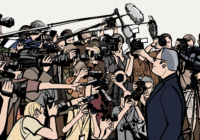The suspense of the week: awaiting Trump’s punishment of Saudi Arabia in the case of journalist Jamal Khashoggi. The Daily Devil’s Dictionary gives its takes.
US politicians have begun reacting to the likely news that Saudi Arabia has taken the liberty of setting up an ambush at its consulate in Istanbul to assassinate journalist Jamal Khashoggi. Republican Senator Lindsey Graham stated the principle: “Our country’s values should be and must be a cornerstone of our foreign policy with foes and allies alike.” Without specifying what those values were, it would appear that among them is refraining from murdering journalists.
Here is today’s 3D definition:
Cornerstone:
An imaginary working principle informing decision-making, formulated as a statement of abstract ideals and intended to make people believe that policy is founded on moral ideals, rather than unstated but very real interests related to money and power
Contextual note
With his usual frankness, Donald Trump reacted to the story of Khashoggi’s disappearance: “I don’t like hearing about it, and hopefully that will sort itself out.” Tellingly, he focuses on his own feelings rather than the moral and eventually political implications of the event. He would have preferred not hearing about it because, if the worst is confirmed, it may require him to take diplomatic action against his favorite dictatorial ally, Mohammed bin Salman (MBS) and undermine the still mysterious Jared Kushner-led plan for peace in the Middle East. By “hopefully it will sort itself out,” Trump appears to mean, “whatever happened, let’s hope that the media stop talking about it sometime soon, so that we can carry on business as usual and continue our great relationship with MBS.”
US-based political analyst Bill Schneider offered this view: “They’re under pressure from members of Congress and the press.” In the coming days and weeks, the world will discover how much pressure that represents and what its effects on policy may be.
Historical note
The real question some are asking is this: If assassinating journalists is an extreme and unacceptable practice that requires diplomatic retaliation, how severe should that retaliation be? Will the US apply the same imposition of sanctions on Saudi Arabia that it did on Russia for assassinating its own dissidents? Might those sanctions be even more severe given the difference between the two cases in terms of values? Russia eliminated a former spy, which could be considered one of the standard risks with spycraft, whereas in assassinating a journalist, Saudi Arabia is attacking the entire notion of press freedom.
Another question that contemporary historians need to ask is this: If dictatorships can freely use disappearance (imprisonment without due process and assassination) to control the media, does this mean that democracies not only cannot control their media, but are forced to accept freedom of the press?
The answer to this is complex. All governments use a panoply of means to limit the free circulation of information, as well as clandestine means of gathering confidential information, which will remain hidden from public scrutiny.
Even Jacob Rees-Mogg, a Conservative Party politician in the UK, admits something his American colleagues often feign to ignore: “Governments want to control information. To do this they have elaborate systems for promoting themselves via propaganda departments, and for ensuring confidentiality with official-secrets laws.” There’s a fine line between controlling information and suppressing it, which few Western governments hesitate to cross when the opportunity arises, unlike the other fine line between suppressing information and suppressing people with information (e.g., journalists), a too obvious no-no.
In the West, and more particularly in the US, the media tend to be obedient to the government for three fundamental reasons. First, they need to remain in the good graces of the government to have access to the scoops governments provide to the compliant (if not complicit) organs of the press. Second, the media draw their revenue from advertising, meaning they must always be careful to spare any criticism of what is essentially a venal system for providing information. Third, the media are themselves corporations whose unique goal is to be profitable for shareholders.
The trick is to encourage the illusion of total freedom of the press by allowing criticism of subjects deemed worthy of criticism — specific actions, initiatives or statements about acceptable topics — and to exclude any form of public discussion of more structural matters that risk creating doubt about the system itself (capitalism, democracy, the party system). Another trick is to occasionally mention deeper critiques, but to brand them as marginal, quirky ideas deserving little or no air time.
All of which takes us back to Mohammed bin Salman, who, as a dictator, can freely suppress both information and people with information because, unlike Trump, he is never “under pressure from members of Congress and the press.” But how great is that pressure in the West, even concerning what goes on in Saudi Arabia? None of the media have offered anything more than an occasional mention (if any) of the Saudi-led war in Yemen that has produced a major humanitarian disaster. A war in which the US establishment has been directly complicit from the beginning.
In other words, the cornerstone of control of information in the US is the thing the nation has showed the most talent for: making money and using the power of money to limit the circulation of information. Who needs to suppress journalists when the media itself has suppressed journalism?
*[In the age of Oscar Wilde and Mark Twain, another American wit, the journalist Ambrose Bierce, produced a series of satirical definitions of commonly used terms, throwing light on their hidden meanings in real discourse. Bierce eventually collected and published them as a book, The Devil’s Dictionary, in 1911. We have shamelessly appropriated his title in the interest of continuing his wholesome pedagogical effort to enlighten generations of readers of the news.]
The views expressed in this article are the author’s own and do not necessarily reflect Fair Observer’s editorial policy.
Support Fair Observer
We rely on your support for our independence, diversity and quality.
For more than 10 years, Fair Observer has been free, fair and independent. No billionaire owns us, no advertisers control us. We are a reader-supported nonprofit. Unlike many other publications, we keep our content free for readers regardless of where they live or whether they can afford to pay. We have no paywalls and no ads.
In the post-truth era of fake news, echo chambers and filter bubbles, we publish a plurality of perspectives from around the world. Anyone can publish with us, but everyone goes through a rigorous editorial process. So, you get fact-checked, well-reasoned content instead of noise.
We publish 2,500+ voices from 90+ countries. We also conduct education and training programs
on subjects ranging from digital media and journalism to writing and critical thinking. This
doesn’t come cheap. Servers, editors, trainers and web developers cost
money.
Please consider supporting us on a regular basis as a recurring donor or a
sustaining member.
Will you support FO’s journalism?
We rely on your support for our independence, diversity and quality.






